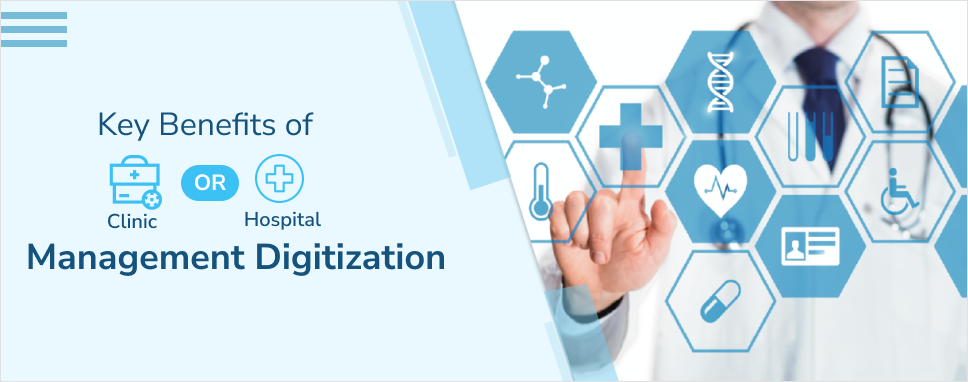 The existence of digital healthcare solutions has enabled hospitals, clinics, and other healthcare facilities to greatly enhance the delivery of medical services and products to their patients. Digital healthcare systems detecting serious diseases at its earliest stage to reducing medical errors to collaborating on a medical case and it also helps in driving business growth. The physicians or nurses can get real-time advice of individual health care working with the online portal system that helps them make clear conclusions on individual treatments and supply timely enhanced results.
The existence of digital healthcare solutions has enabled hospitals, clinics, and other healthcare facilities to greatly enhance the delivery of medical services and products to their patients. Digital healthcare systems detecting serious diseases at its earliest stage to reducing medical errors to collaborating on a medical case and it also helps in driving business growth. The physicians or nurses can get real-time advice of individual health care working with the online portal system that helps them make clear conclusions on individual treatments and supply timely enhanced results.
Storage and Retrieval of Patient Data
Digital healthcare software ensures that you can store patient information like demographics, medical history, allergy, diagnosis, findings and prescriptions, and other medical details can be saved and access easily. Access can be configured for added security, granting access to only those who are directly involved in patient care. Medical professionals can have access to patient's data in a few clicks.
Medical and Patient History Management
The key benefit of clinic management software to monitor patient's medical history like (demographics, diagnosis, prescription, admission, discharge, etc.). it also eliminates the problems faced by the old system and improve the efficiency of patient records management that is cost-effective, less time consuming, renders accuracy and privacy to authorized users.
Better Inter-Departmental Co-ordination
Inter-departmental communication or coordination is a crucial component of the healthcare process. Whether a clinic accurately sharing patient's information with another facility, or group of doctors, nurses, specialists, and other staff at a hospital how to treat current and coming patients, the need for concise, effective communication is always present in the healthcare.
Reduces Patient Waiting Time
By using clinic management resources more efficiently and tapping technology that helps patients access their care, the organization can work to reduce appointments wait times for patients. You can also reduce patient waiting time by gathering patient information before their scheduled appointment, delegate documentation to other trained staff, create a policy for no-show and late arrivals and implement mobile queue solutions.
Reduces Clinical Errors and Issues
For making real progress toward reducing clinical error and issues, facilities must be committed to making significant changes. A recent study in IBM estimates that the death of over 250000 patients was directly caused by a preventable error that affected their care. Appropriate increases in the use of information technology in healthcare especially help in clinical support and better linkages in and among system, resulting in process simplification could result in substantial improvement in patient safety.
Helps in Retrospective Studies, Research, and Legal Cases
AI has already been applied successfully to such as improving healthcare and reducing estimation biases in retrospective studies. Healthcare research is important as it can provide insight into issues such as population health management, patient mobility trends, healthcare delivery challenges, and care best practices, areas that impact the international patient experience.
Data security and reduces medical frauds and cases
Every data is unique and it is essential to maintain data along with its security. The most useful method for healthcare data protection is to use an encryption method. There are some other methods like protecting the network, educate staff members, secure wireless network, implement physical security control, delete unnecessary data that help in reducing the medical data frauds. Developing a strong compliance program is the key to preventing healthcare fraud and abuse activities.
Easy management of appointments and other clinical processes
Technology during the appointment management process has become increasingly popular for clinics/hospitals. Digital appointment management is typically much easier for patients. Appointment management extensively used to reduce patient waiting times. Appointment management also helps in improving the communication and interaction of doctors with patients. Technology allows the healthcare profession to maintain electronic records, manage online billing, keep track of patient’s information.
Conclusion
A patient medical record can be manipulated like sort data, data handling, search update, store patient’s medical records securely. Hospital/clinic management software reduces the paperwork, reduces the time spent by patients waiting for their files to retrieve, reduces storage space, increases the transmission rate of data, cost-effective and allowing patients to be monitored by healthcare professionals from home or at work. Computerized patient medical record system to minimize data inefficiency, and undependability posed by the traditional system. Health care professionals and institutions need to recognize the importance of communication in health care to thrive. Clinic/hospital management software like +Doctor gives a fast easy and simple solution for managing day-to-day activities. It helps inpatient management, inventory management, employees and doctor's attendance management, and online report generation and other tasks.











